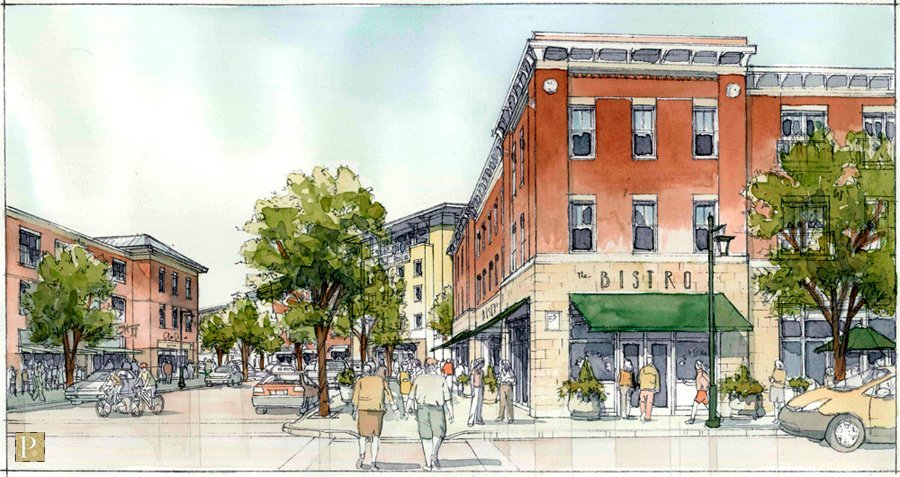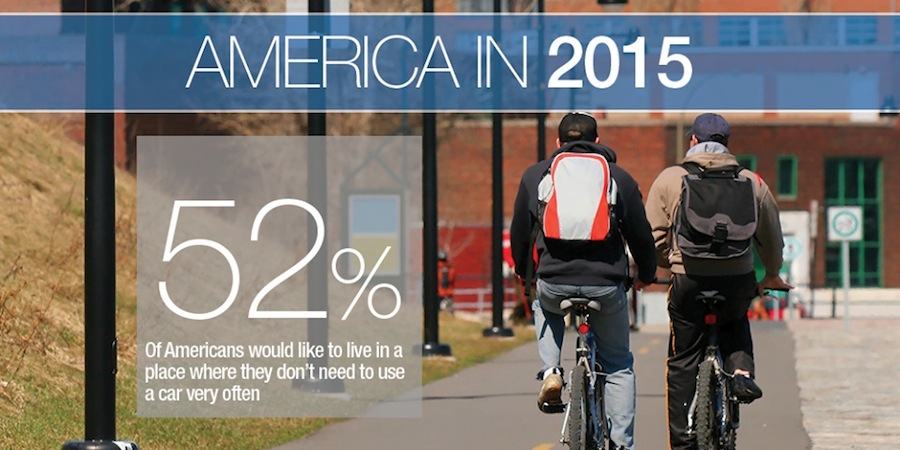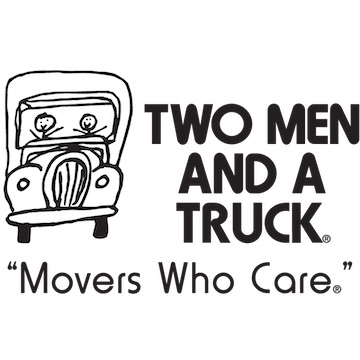McDowell, Bonini, Osienski and Keeley Introduce Bicycle-Friendly Economic Development Bill


UPDATE: Delaware Passes Innovative “Complete Communities” Bill
JULY 1 (UPDATE): Delaware General Assembly adjourns without Senate vote on legislation.
State Senators Harris McDowell and Colin Bonini and State Representatives Ed Osienski and Helene Keeley have introduced bicycle-friendly economic development legislation in the Delaware General Assembly.
The innovative bill – known as the Healthy and Transit-Friendly Development Act – would establish a simple framework for local and state governments in Delaware to cooperate in creating walkable, bikeable and transit-friendly communities.
In bikeable communities everyday destinations are within easy cycling distance, streets are safe and comfortable and cars move slowly.
Since World War II, economic development in Delaware has mostly been bicycle (and walking and transit) unfriendly. A highly auto-centric subdivision-shopping mall-office park pattern of development has instead dominated. This style of development, while sometimes lucrative in the short-term, has four notable long-term weaknesses:
 For a given amount of public infrastructure (roads, sewers etc) and services (police, fire, EMT, transit etc.) investments and ongoing public expenditures, the subdivision-shopping mall-office park style of development generates a relatively lower amount of economic activity (and corresponding government tax receipts).
For a given amount of public infrastructure (roads, sewers etc) and services (police, fire, EMT, transit etc.) investments and ongoing public expenditures, the subdivision-shopping mall-office park style of development generates a relatively lower amount of economic activity (and corresponding government tax receipts).
 With daily destinations spread out over long-distances and efficient transit solutions financially difficult to provide, almost every single adult (and even teenagers) living in a residential-only subdivision must own a personal motor vehicle in order to meet their daily mobility needs. Since Delaware neither pumps oil nor manufacturers cars, nearly every cent of these Delaware household expenditures leaves the state, creating a permanent drag on Delaware’s economy.
With daily destinations spread out over long-distances and efficient transit solutions financially difficult to provide, almost every single adult (and even teenagers) living in a residential-only subdivision must own a personal motor vehicle in order to meet their daily mobility needs. Since Delaware neither pumps oil nor manufacturers cars, nearly every cent of these Delaware household expenditures leaves the state, creating a permanent drag on Delaware’s economy.
 Safe and practical opportunities to walk and bicycle for daily transportation helps maintain a healthy weight and prevent heart disease, type 2 diabetes, and other chronic diseases. Subdivision-shopping mall-office park development, however, usually eliminates these opportunities. Nearly two-thirds of adults and almost 40% of children in Delaware are now classified as overweight or obese.
Safe and practical opportunities to walk and bicycle for daily transportation helps maintain a healthy weight and prevent heart disease, type 2 diabetes, and other chronic diseases. Subdivision-shopping mall-office park development, however, usually eliminates these opportunities. Nearly two-thirds of adults and almost 40% of children in Delaware are now classified as overweight or obese.
 For the last two years that federal statistics are available, Delaware has had the highest per capita pedestrian fatality rate in America. The large majority of these pedestrian fatalities occur on Kirkwood Highway, Dupont Highway, Concord Pike, Pulaski Highway and the other high-speed, multi-lane arterial “corridor” roads in suburbs that have expanded to serve subdivision-shopping mall-office park style development and the very heavy levels of motor vehicle traffic that it generates.
For the last two years that federal statistics are available, Delaware has had the highest per capita pedestrian fatality rate in America. The large majority of these pedestrian fatalities occur on Kirkwood Highway, Dupont Highway, Concord Pike, Pulaski Highway and the other high-speed, multi-lane arterial “corridor” roads in suburbs that have expanded to serve subdivision-shopping mall-office park style development and the very heavy levels of motor vehicle traffic that it generates.
Meanwhile, retiring Baby Boomers and Millennials – among many others – are both looking for housing and work opportunities in places that do not follow the subdivision-shopping mall-office park pattern. In a recent national poll, 52% of all Americans said they would like to live in a place where they don’t need to use a car very often.
These changes in demographics and preferences are an opportunity. “‘Complete Communities’ are a critical strategy,” said Senator McDowell, the prime sponsor of the Healthy and Transit-Friendly Development Act in the Delaware State Senate, “for economic development in Delaware. But they also simultaneously address the strained finances of our transportation system and are good for our environment too. That’s a policy win-win-win.”
One of the prime sponsors of the Healthy and Transit-Friendly Development Act in the Delaware House of Representatives is Representative Ed Osienski. “All Delawareans deserve to live in communities that are walkable and bikeable with access to good public transportation,” said Representative Osienki. “I am hopeful that we can continue our efforts to make this goal a reality and build more of these beautiful, resilient and ‘complete’ places.”

Transit-friendly, walkable and bikeable development is an enormous economic development opportunity for Delaware – if we can seize it.
RELATED:
•Healthy and Transit-Friendly Development Act (Delaware Senate Bill 130)
• Trends in Delaware’s Growth and Spending Summary Report
• Why you can’t have bus service
• Delaware’s #3 Bicycle Friendly State “Report Card” (calls for encouraging bicycle-friendly development)






6 Responses
Awesome! Please keep up the good work in making Delaware a place for people to rely on themselves for their transportation needs, and improving their health. I ride my bike as much as possible, and offer free group trail bike tours every week to promote this beautiful state and health benefits of being physically active.
Thank you! We really appreciate this kind of feedback.
Also, while the idea of selling to the “millennials” generation, it’s also important to remember that many of these corridors: Kirkwood, Pulaski, Concord, etc. are filled with people who are often forgotten, the poor, disabled, elderly who for whatever reason need to walk, or bike places but the current infrastructure was never built with them in mind.
Sadly, we are still building bus shelters in the middle of no where, bike paths and sidewalks that start and end nowhere, and car corridors with no pedestrian safety measures.
As harsh as it is to say, Delaware is the First State of killing pedestrians. And the reason for that is those high-speed, multi-lane arterial corridors. When they were built, they were surrounded by farmland and they weren’t a problem the way they later become because they became the location of a lot of commercial development.
Senator McDowell’s bill doesn’t solve the problem of Kirkwood Highway and the other dangerous corridor arterials. But it is critically important because it puts an alternative vision – one that is fundamentally pedestrian and cyclist friendly – on the table to compete against more “corridor” development (which is the last thing Delaware needs more of).
Here’s an out of the box “radical” for sure idea.
Let’s start by taking one of the busy hi ways and take away a lane,half in one direction and the other the opposite side, and segregate it for bikes and pedestrians only. This will put our intention where our mouth is , it will also get everyone’s attention as the traffic slows down and people find there commute will take longer,as this happens some of those drivers will by a bike ,and so it begins.
It’s a crazy idea , I know , but take one road at a time and see what happens. Just do it !
I’m super excited about this legislation. I love Delaware, and I have thought for years that the disorganized suburban style of development in this state is the #1 thing holding this state back from being all it could be. The places I love most in Delaware, like Newark, parts of Wilmington, Rehoboth Beach and the other beach towns, or downtown Dover, or Delaware City, are all old urban centers and towns that have this style of development already.
I find these places so much more pleasant to be in, and to live in. I especially love Newark because I’m able to walk and bike everywhere.
I’ve always thought: “Why can’t all of Delaware be like this?” And I think it could be–if we made a commitment to it. I think there’s a degree to which a lot of people in our society are only now waking up to the hidden costs of suburban living. It’s like, the suburban style of development superficially looks appealing: you can buy a big house with a big lot for a moderate price, and the car roads work well enough that you can get to work and shop wherever you want.
But then the problems rear their head, the fact that you’re sitting in a car all the time, that you can’t walk anywhere, that the low-density development means the public transportation doesn’t work well, and there is the cost in human health and human life (I feel so sad whenever I see people trying to cross roads like Kirkwood Highway, where there are often not even any crosswalks), and also the huge wasteful expenditures.
I really hope that this legislation keeps gaining energy and support, and that it goes through, and that people keep modifying and tweaking it to ensure that it achieves the goals it was set out to achieve. I think this could be the best thing that has happened to Delaware for years, and it could have compelling benefits for generations to come.